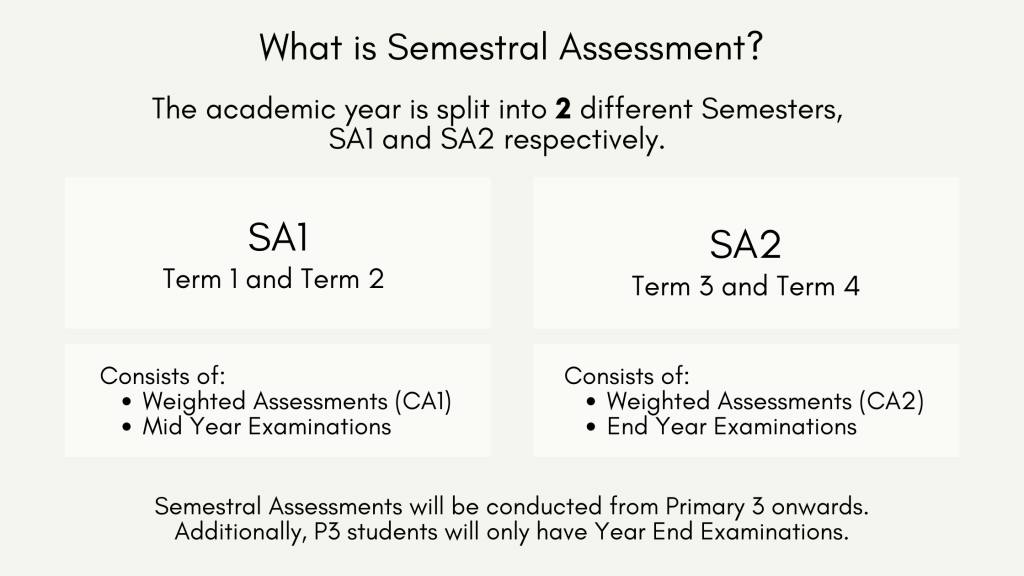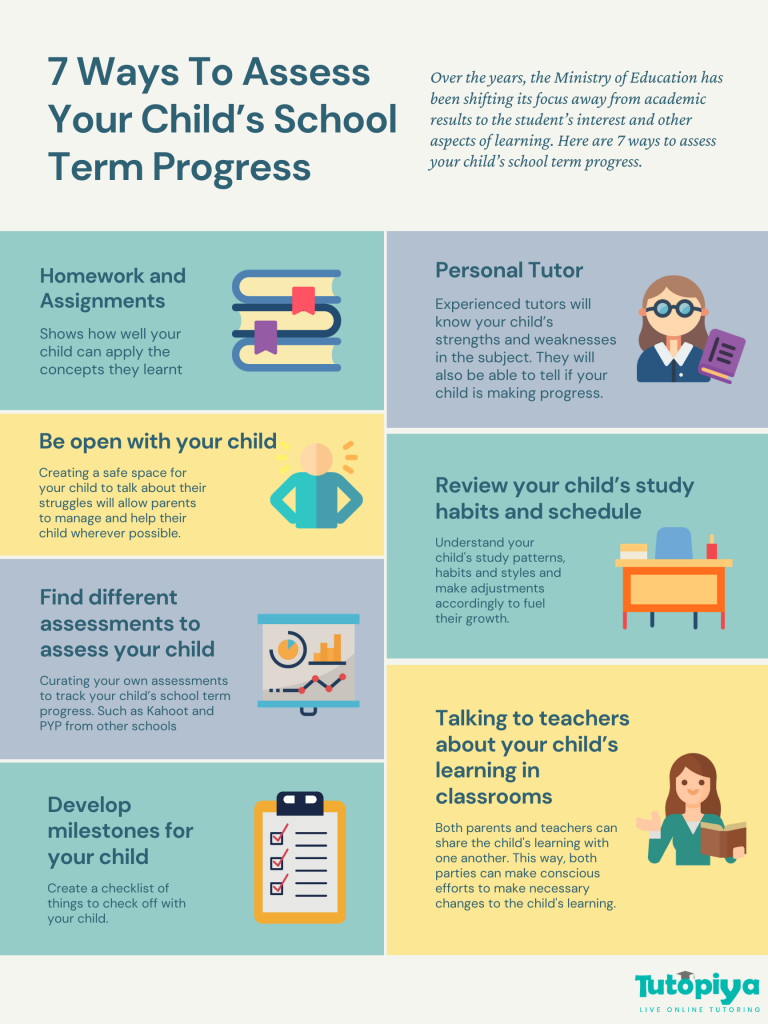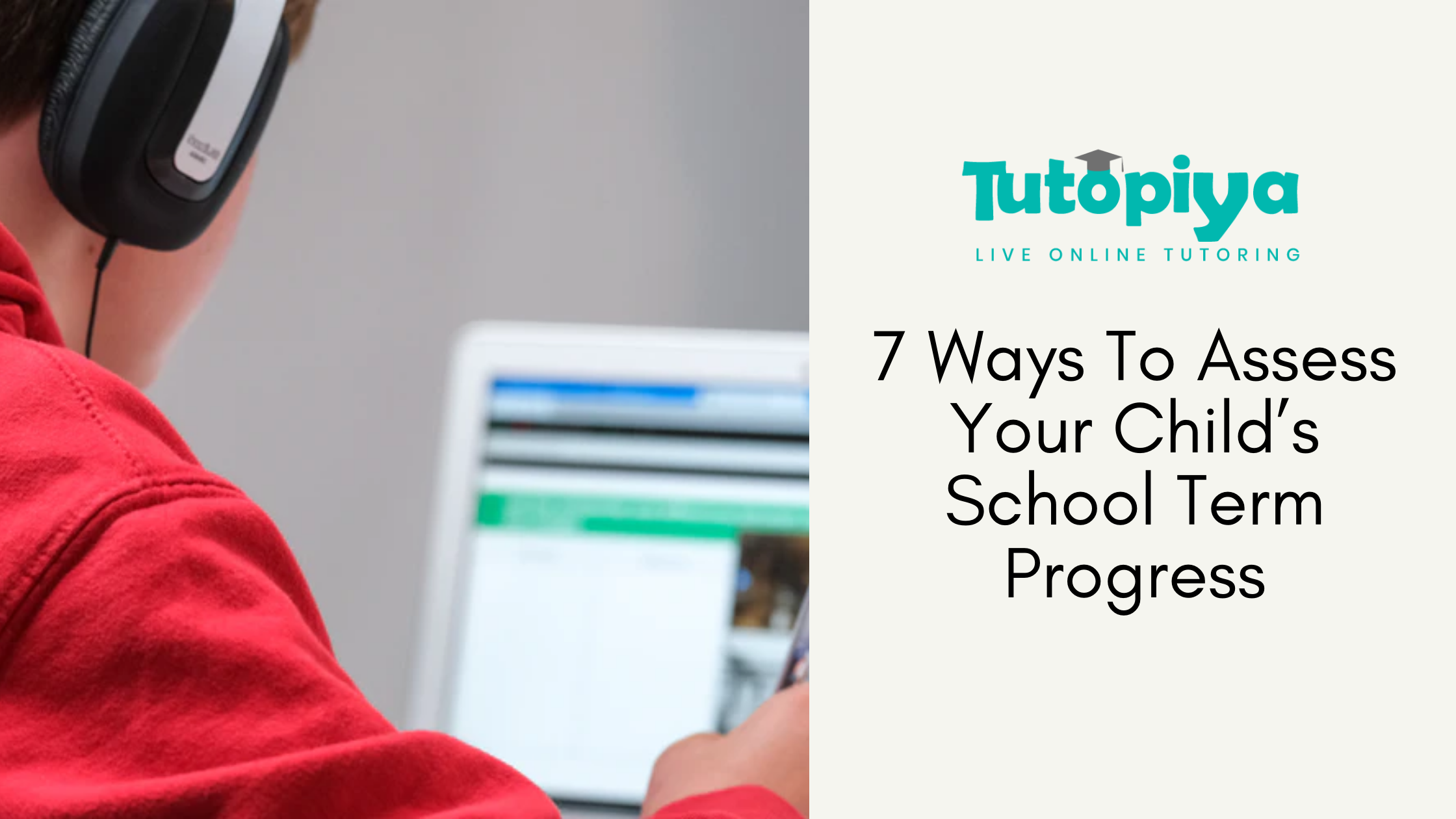A typical school year for primary school and secondary school can be divided into 2 different semesters known as SA1 and SA2 respectively. Now that mid-year examinations have been removed for some levels, it can be harder to track your child’s learning progress. This article will bring you 7 ways to assess your child’s school term progress.
You can also find a summarised infographic at the end of the article.
Typical semester breakdown
Over the years, the Ministry of Education has been shifting its focus away from academic results to the student’s interest and other aspects of learning.
Hence, MOE has removed examinations for primary 1 and 2 students. Semestral Assessments will only be conducted from Primary 3 onwards.
For more information, you can visit the official MOE website to find out more.

Here are the updated assessments for primary school students.
| Types of Examination | |
| Primary 1 | No examinations |
| Primary 2 | Only end of year examinations |
| Primary 3 | Year-End Examinations and weighted assessments throughout the year |
| Primary 4 to Primary 6 | Mid Year Examinations, Year-End Examinations and weighted assessments throughout the year. |
This is how the School Terms look like for a Singapore primary and secondary student.
| PRIMARY & SECONDARY | |
| Semester 1 | |
| Term 1 | Jan to Mar |
| 1 week of MarchSchool Holidays | |
| Term 2 | Mar to May |
| Semester 2 (1 month of school holidays) | |
| Term 3 | Jun to Sep |
| 1 week of September School Holidays | |
| Term 4 | Sep to Nov |
Why are SA1 and SA2 important?
The SA1 comprises Mid Year examinations (for Primary 3 onwards) and weighted assessment, whereas SA2 comprises Year-End examinations and weighted assessment.
For SA1, only half of the topics will be covered for Mid Year examinations whereas for SA2, it comprises the Year-End Examinations, where all the topics will be covered for examination.
These examinations will help your child to understand where they stand and what their strengths and weaknesses are. These examinations are crucial to prepare your child for their PSLE.
Since the MOE has removed mid-term examinations for several primary and secondary levels, it can be difficult to track your child’s progress. Therefore, here are 7 ways you can assess your child’s school term progress.
7 ways to track your child’s school term progress
1 – Homeworks and assignments
One good way to track your child’s school term progress is by reviewing your child’s homework. Their assignments and homework are a clear indication of how well they are able to apply the concepts they learnt in class into the work.
It is also useful to spot your child’s common mistakes in their work and correct them where necessary.
2 – Personal Tutor
Having a personal tutor for your child helps with tracking their progress in studies. Experienced tutors will know your child’s strengths and weaknesses in the subject. They will also be able to tell if your child is making progress.
Having a tutor helps to close up any knowledge gaps your child may have. On top of that, they have access to extra resources and materials that can help challenge your child’s problem-solving skills.
Tutopiya offers a pool of experienced tutors that have been highly trained and screened to deliver effective live online tuition. Our tutors are experienced in MOE primary, secondary and tertiary education. Tutopiya will customize a teaching plan that will best suit your child’s learning habits and style. This way, your child will be able to learn and grow effectively.
3 – Be open with your child
Talking to your child and establishing a tight bond with your child is also helpful. Creating a safe space for your child to talk about their struggles will allow parents to manage and help their child wherever possible.
You can change up your child’s learning schedule or learning plan accordingly to fit your child’s learning needs.
4 – Review your child’s study habits and schedule
As parents, you may have to pay extra attention to your child’s learning habits. Are they restless at certain times of the day? Do they study better at a certain spot at home? These little things are crucial for your child’s learning. This could make or break your child’s growth and development in learning. If the environment is not conducive for your child to study, it could be a potential problem for their stagnant growth.
Read also: 4 Useful and Effective Time Management Tips for Students
5 – Find different assessments to assess your child
Different assessments can come in any form, you can even make it fun for your child. You can try curating your own assessments to track your child’s school term progress and here are some suggestions for you!
– Past year papers or homework from other schools
– Try online games such as Kahoot to make it fun
– Do hands-on activities or practicals and have your child explain to you the purpose and objectives of the activities (there are plenty of easy to make practicals on Youtube)
6 – Develop milestones for your child (Progress Trackers)
At the start of the year, you and your child can both establish a checklist of things to check off. These milestones can be inferred from your child’s textbooks (concepts, topics etc). These milestones are unique to your child’s learning and goals.
As your child progresses through the year, keep this progress tracker around and it would be astonishing to find out how much your child has accomplished during the year!
7 – Talking to teachers about your child’s learning in classrooms
Parent-teacher conferences are a great time to ask your child’s form teachers about their learning progress and studying habits in school.
Both parents and teachers can exchange information about your child for both parties to make necessary changes to help their learning.
All in all, it is good to start establishing good study habits for your child as young as possible. This helps them to be in their best state when they sit for their national exams during their graduating year.
Read also: How to Cultivate A Good Studying Habit
7 ways to assess your child’s school term progress


